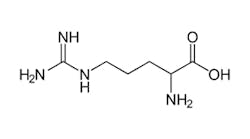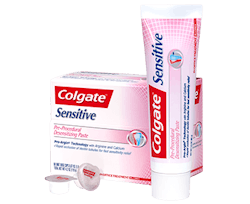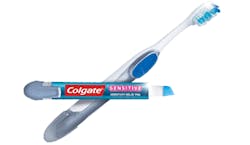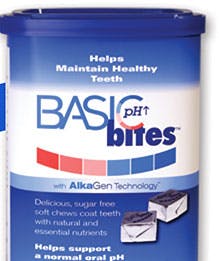Arginine: New study exposes additional oral health benefits
This article originally appeared in RDH eVillage Focus, a newsletter prepared for dental professionals looking for hard-hitting, current information. You can subscribe here.
When combined with calcium, arginine has been clinically proven to be significantly effective in reducing caries and treating dentinal sensitivity. A common amino acid, arginine is naturally found in saliva and is metabolized by certain pH-raising oral bacteria that generate alkali instead of acids. In a normal and neutral oral pH environment, the addition of calcium aids in the remineralization process. Additionally, these two nutrients have been proven to plug and seal open dentinal tubules. This article will review some of the benefits of arginine.
May disrupt dental plaque
New research, conducted at the University of Michigan, suggests that arginine may also break down dental plaque, which could help millions of people avoid dental decay and gum disease. (1) Alexander Rickard, assistant professor of epidemiology at the U-M School of Public Health, and colleagues discovered that in the lab L-arginine stopped the formation of dental plaque.
ALSO BY SHANNON NANNE, RDH |The magic of pH
The mechanism by which L-arginine causes the disintegration of the biofilms needs further study, the researchers said. It appears arginine can change how cells stick together, and can trigger bacteria within biofilms to alter how they behave so that they no longer stick to surfaces, they remarked. Pending further clinical trials to verify their lab findings, the researchers said L-arginine could take the place of the current plaque-controlling biocide substances including chlorhexidine and other antimicrobials.
READ MORE | Arginine bicarbonate-calcium carbonate soft chews seal open dentinal tubules in hydraulic conductance test
READ MORE | BasicBites at RDH Under One Roof—hygienists "take the bite"
There have been numerous clinical trials that have evaluated the addition of arginine/bicarbonate and calcium carbonate in oral care products for treating dentinal sensitivity and dental caries. Clinical trials have shown that arginine/bicarbonate and calcium carbonate-containing dentifrice products, with and without fluoride, were significantly effective in reducing dentinal sensitivity by plugging and sealing dentinal tubules. (2, 3, 4) Clinical studies evaluating arginine/bicarbonate and calcium carbonate-containing dentifrice products, with and without fluoride, were shown to have significant anti-caries benefits. (5, 6, 8)
The role saliva plays in protecting teeth has become clearer. Landmark research in saliva chemistry along with supporting clinical studies strongly suggests that arginine, in combination with calcium and bicarbonate, is a new breakthrough in the science of oral care.
References
1. Kolderman E, Bettampadi D, Samarian D, et al. L-Arginine Destabilizes Oral Multi-Species Biofilm Communities Developed in Human Saliva. PLoS One. 6;10:e0121835. doi: 10.1371/journal.pone.0121835.
2. Schiff T, Delgado E, Zhang YP, Cummins D, DeVizio W and Mateo LR. Clinical evaluation of the efficacy of an in-office desensitizing paste containing 8% arginine and calcium carbonate in providing instant and lasting relief of dentin hypersensitivity. Am J Dent. 2009;22 (Spec No A): 8A-15A.
3. Schiff T, Mateo LR, Delgado E, Cummins D, Zhang YP, DeVizio W. Clinical efficacy in reducing dentin hypersensitivity of a dentifrice containing 8.0% arginine, calcium carbonate, and 1450 ppm fluoride compared to a dentifrice containing 8% strontium acetate and 1040 ppm fluoride under consumer usage conditions before and after switch-over. J Clin Dent. 2011;22:128-38.
4. Petrou I, Heu R, Stranick M, et al. A breakthrough therapy for dentin hypersensitivity: how dental products containing 8% arginine and calcium carbonate work to deliver effective relief of sensitive teeth. J Clin Dent. 2009;20:23-31.
5. Kraivaphan P, Amornchat C, Triratana T, et al. Two-year caries clinical study of the efficacy of novel dentifrices containing 1.5% arginine, an insoluble calcium compound, and 1450ppm fluoride. Caries Res. 2013;47:582-90.
6. Souza MLR, Cury JA, Tenuta LMA, et al. Comparing the efficacy of a dentifrice containing 1.5% arginine and 1450 ppm fluoride to a dentifrice containing fluoride alone in the management of primary root caries. J Dent. 2013;41(Suppl 2):S35–S41.
7. Acevedo AM, Machedo C, Rivera LE, Wolff M, Kleinberg I. The inhibitory effect of an arginine bicarbonate/calcium carbonate Cavistat-containing dentifrice on the development of dental caries in Venezuelan school children. J Clin Dent. 2005;16:63-70.





